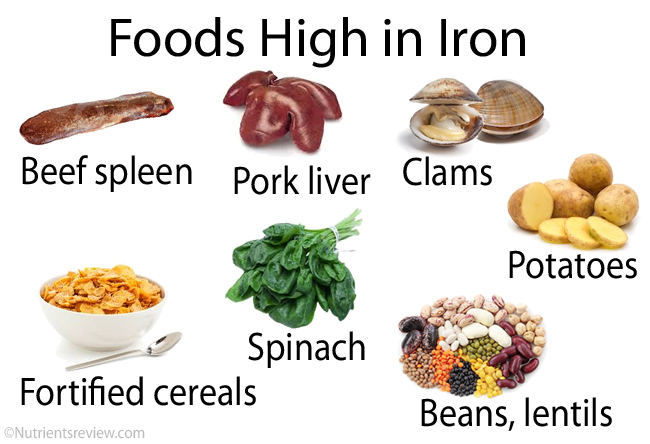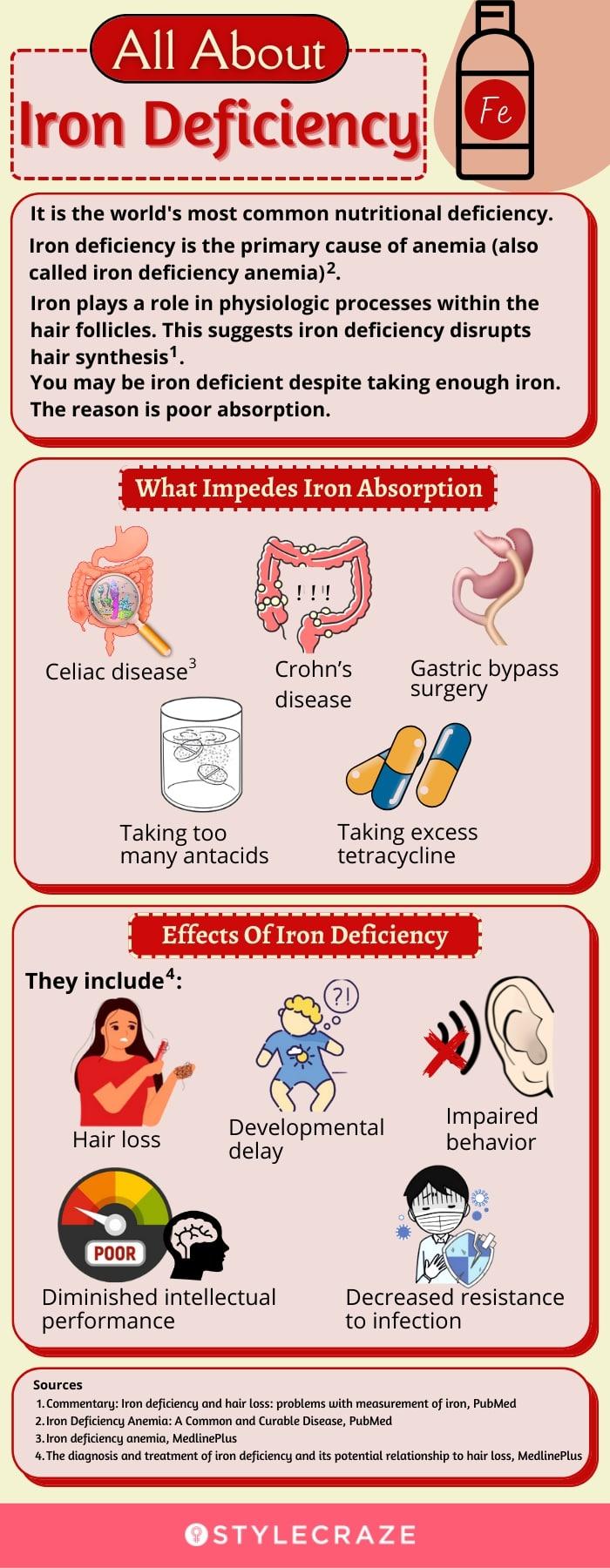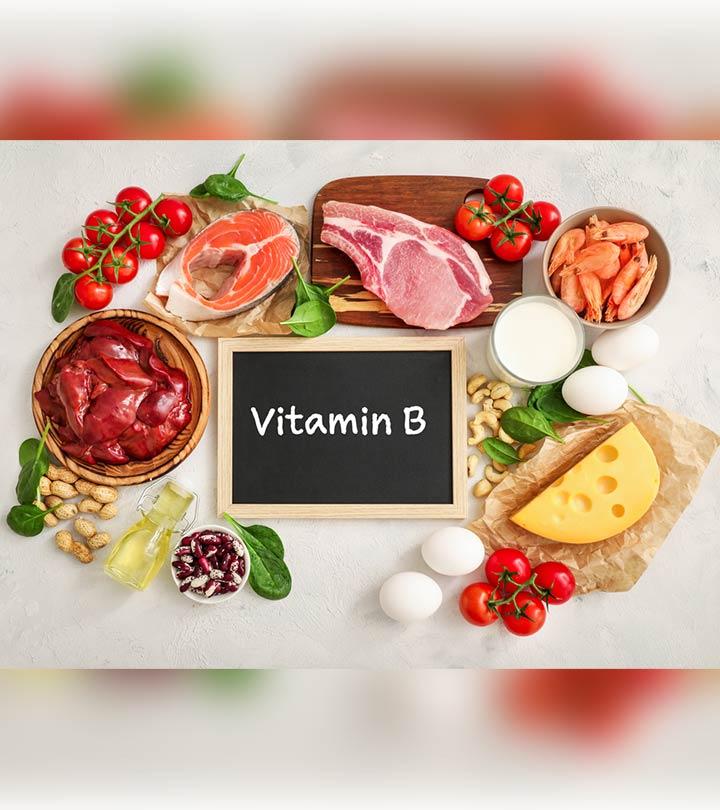Iron is beneficial for hair growth and can be found in foods like lentils, chickpeas, and kidney beans, which also provide essential protein for healthy hair growth. It helps strengthen hair follicles, improve hair shine, thicken the hair, and nourish hair roots.
However, taking iron supplements can have side effects such as gastrointestinal discomfort and changes in stool color. Therefore, consuming iron-rich foods as part of a balanced diet for optimal hair growth is essential.

Food Sources Of Iron For Hair Growth
Iron is a vital nutrient for healthy hair growth. It helps in the production of hemoglobin, which carries oxygen to the hair follicles. Whether you follow a plant-based or animal-based diet, there are several food sources rich in iron that you can incorporate into your meals to promote optimal hair growth.
Plant-based Sources Of Iron
For those following a vegetarian or vegan diet, plant-based sources of iron can provide a significant amount of this essential nutrient. Here are some examples:
- Spinach: This leafy green vegetable is rich in iron and packed with other nutrients like vitamins A and C, which help in iron absorption.
- Lentils: These legumes are a great source of iron and provide a good amount of protein and fiber, making them an excellent choice for overall hair health.
- Sunflower seeds: Besides being rich in iron, sunflower seeds also contain vitamin E, which promotes healthy hair and scalps.
Animal-based Sources Of Iron
If you consume animal products, there are various options for obtaining iron from these sources. Some animal-based foods rich in iron include:
- Red meat: beef and lamb are exceptionally high in iron. They also contain vitamin B12, which is crucial for healthy hair growth and prevents hair loss.
- Seafood: Shellfish like oysters and clams are excellent sources of iron. They also provide omega-3 fatty acids, promoting hair growth and preventing loss.
- Eggs: Eggs are a good source of iron and contain biotin, which is essential for healthy hair growth and strength.
Combining Iron-rich Foods With Other Nutrients For Optimal Hair Growth
While incorporating iron-rich foods into your diet is necessary for hair growth, combining them with other hair-boosting nutrients can further enhance their benefits. Here are some examples:
| Iron-rich Food | Additional Nutrient |
|---|---|
| Spinach | Vitamin C-rich foods like citrus fruits or bell peppers help absorb iron. |
| Red meat | Foods high in zinc, such as pumpkin seeds or shellfish, aid in producing hair proteins. |
| Lentils | Vegetables rich in vitamin A, like sweet potatoes or carrots, are necessary for the production of sebum, which keeps the scalp moisturized. |
Combining these iron-rich foods with other nutrients can give your hair the essential building blocks for optimal growth.

Managing Iron Levels For Healthy Hair
Signs And Symptoms Of Iron Deficiency
Iron deficiency is a common condition affecting overall health, including hair growth. Recognizing the signs and symptoms of iron deficiency can help manage iron levels for healthy hair. Some of the common signs include:
- Fatigue and weakness
- Pale skin and brittle nails
- Shortness of breath
- Irritability
- Headaches
- Difficulty concentrating
Addressing Iron Deficiency Through Diet And Supplementation
Addressing iron deficiency is crucial for promoting hair growth. Including iron-rich foods in your diet can help increase iron levels in the body. Some of the food sources that are high in iron include:
| Food Sources | Iron Content (per serving) |
|---|---|
| Red meat (such as beef and lamb) | 2.5-3.5 mg |
| Shellfish (such as clams and oysters) | 2.0-3.5 mg |
| Legumes (such as lentils and chickpeas) | 2.0-2.5 mg |
| Dark leafy greens (such as spinach and kale) | 1.0-2.0 mg |
| Nuts and seeds (such as pumpkin seeds and almonds) | 1.0-2.0 mg |
Sometimes, dietary changes may not be sufficient to address iron deficiency. In such cases, iron supplements may be recommended by a healthcare professional. However, consulting with a healthcare professional before starting any supplementation is essential.
Tips For Preventing Iron Deficiency And Promoting Hair Growth
Preventing iron deficiency is crucial to promoting healthy hair growth. Here are some tips to ensure adequate iron levels:
- Include iron-rich foods in your diet regularly.
- Pair iron-rich foods with foods high in vitamin C, as it enhances iron absorption.
- Avoid drinking tea or coffee with meals, as they can inhibit iron absorption.
- Consider cooking on cast-iron cookware, as it can increase dietary iron intake.
- Monitor your iron levels regularly, especially if you are experiencing symptoms of iron deficiency.
By managing iron levels through diet and supplementation, you can promote healthy hair growth and maintain overall well-being.

Frequently Asked Questions Of Iron For Hair Growth: Benefits, Food Sources, And Side Effects
What Foods Are High In Iron For Hair Growth?
Iron-rich foods for hair growth include legumes like lentils, chickpeas, and kidney beans. These foods are rich in iron and provide essential proteins for healthy hair growth.
What Are The Side Effects Of Iron In Food?
The side effects of iron in food include gastrointestinal issues like nausea, constipation, and diarrhea. Other possible side effects are a metallic taste, teeth staining, and discomfort in the stomach. It’s essential to consult a healthcare professional before taking iron supplements.
What Food Is Highest In Iron?
Foods high in iron include legumes like tile chickpeas and dark, leafy green vegetables like spinach and broccoli. Iron-fortified bread and cereal, nuts and seeds, dried fruit, wholemeal pasta and bread, and tofu are good sources.
What Are The Side Effects Of Taking Iron Supplements?
The most common side effects of taking iron supplements include gastrointestinal issues like nausea, constipation, or diarrhea. Other side effects may include a metallic taste, staining of the teeth, or epigastric distress. Changes in stool color and caliber are also possible.
Conclusion
Iron is crucial in promoting hair growth and maintaining its health and vitality. Individuals can nourish their hair follicles and enhance their strength and shine by consuming iron-rich foods like legumes and dark leafy greens. However, it’s important to note that excessive iron intake can lead to side effects such as nausea or constipation.
As with any dietary change or supplementation, it’s advisable to consult with a healthcare professional for personalized advice. Remember, a well-balanced diet and proper hair care routine are crucial to optimal hair growth and overall well-being.
DIY hair oils are some of the most important ingredients to have in your beauty arsenal. They add shine, manage frizzy hair, and help improve your hair health.